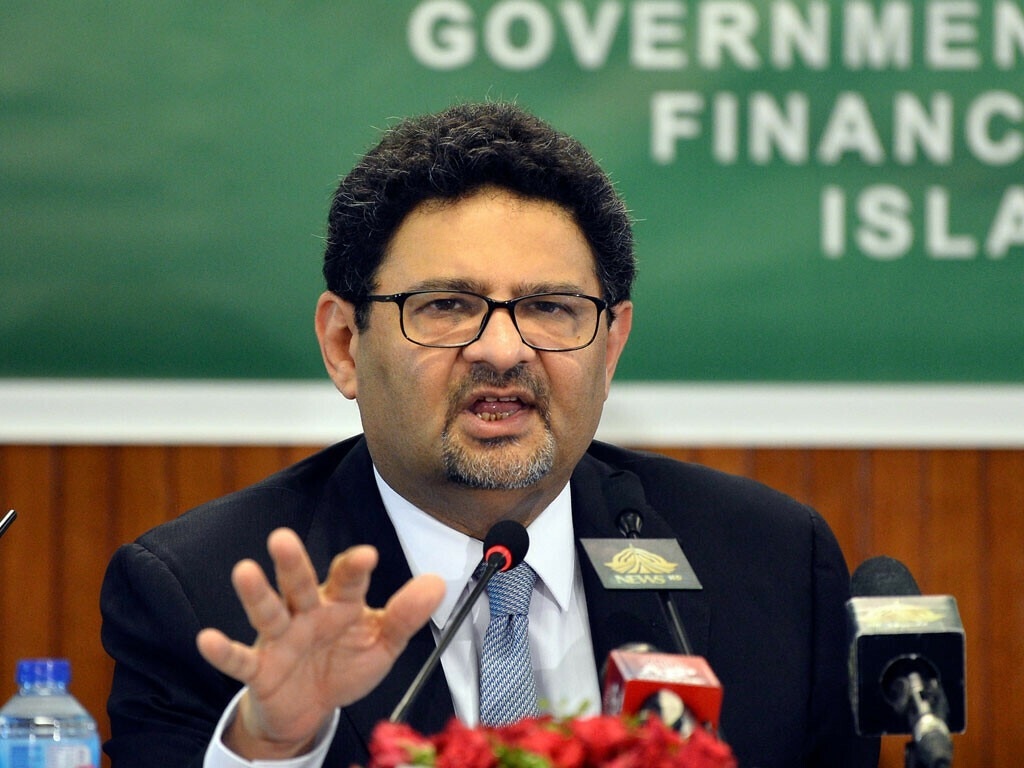Miftah warns of food insecurity as floods dent wheat, rice crops
- At event in Karachi, finance minister stresses that the 'world does not want to lend to Pakistan anymore' so it is imperative to 'live within our means' to ensure sustainable, long-term growth
Federal Minister for Finance and Revenue Miftah Ismail on Friday warned that a food crisis could be in the offing after the recent floods that have caused widespread loss of lives, devastation and displacement of millions in Pakistan.
Addressing a discussion on 'The Current State of Pakistan's Economy' at the Institute of Business Administration (IBA) Karachi on Friday, Miftah said that it was crucial that the process of sowing wheat crops begins in Sindh.
“Wheat farming should commence in Sindh by mid-October at least, for which dry land is required and if this doesn’t happen, it would result in a very bleak spring,” he warned, urging the Sindh government to address the issue of water-logging caused by floods.
Private sector allowed to import wheat
Pakistan has been ravaged by torrential rains resulting in flash floods from north to south that have resulted in over 1,300 deaths while causing large-scale infrastructure damage. The country’s agricultural sector, especially in Sindh and Balochistan, has been hit the hardest with the finance ministry also recently warning that production of major crops would be affected due to the floods.
Recent floods to adversely affect Kharif crops, warns Pakistan's finance ministry
The finance minister said 100% of the cotton crop in Sindh, which accounts for 28-30% of the crop in Pakistan, has been destroyed, which amounts to losses of at least $1 billion.
We need to live within our means, as the world doesn’t want to lend us money anymore. Secondly, we need to improve our agrarian efficiency. Thirdly, we need to increase our export base, while fourthly, we should educate our children: Miftah Ismail on the way forward for Pakistan's economy
“This will cascade through the economy,” he said.
Moreover, 20% of the sugarcane crop in Sindh has been damaged, which makes up 10% of the entire country’s sugarcane production, he said.
“More than half of Sindh’s onion and tomato crop has been destroyed and 80% of the rice crop has also been destroyed, which will adversely affect farmers in the province,” he shared.
Government officials have estimated that the ongoing floods would cost Pakistan $10 billion in losses.
Miftah shared that over 800,000 livestock perished due to floods, mostly in Balochistan. He said that the government has transferred Rs25,000 to each family of flood-affected people through the BISP programme.
On the economy, the finance minister said that being a relatively young country, bringing growth is not difficult in Pakistan. “However, when this GDP growth exceeds 5-6%, we end up with a current account deficit issues,” said Miftah.
Last year, as growth exceeded 5%, the country faced a current account deficit of $17.5 billion, while its forex reserves stood at only $10.3 billion.
“Moreover, the trade deficit stood at $49.4 billion, i.e. 15% of the GDP, the highest in Pakistan history in both absolute and GDP terms,” he said.
“Pakistan faces a boom-and-bust cycle every now and then. The country’s taxation system is import-based, as 52% of the collection is through ports in customs duties, sales tax etc.
Floods, other water-related disasters could cost global economy $5.6 trillion by 2050: report
“This raises the prices of imported products while creating barriers to entry, which allows companies selling goods in Pakistan to earn heavy profits. Thus, they only sell their products to Pakistan instead of exporting them."
“80% of the Pakistani manufacturers are selling goods in the country,” said Miftah, adding that his conversations with the country's auto sector were about ensuring Pakistan starts exporting in the next few years.
On the way forward, Miftah highlighted four key points to achieve long-term, sustainable economic growth.
“Firstly, we need to live within our means, as the world doesn’t want to lend us money anymore. Secondly, we need to improve our agrarian efficiency,” he said. “Thirdly, we need to increase our export base, while fourthly, we should educate our children,” he added.
On rising inflation, Miftah said that the government’s priority was to save the country from default and measures taken included hiking fuel and electricity rates.
“The fuel adjustment charges have been heavily increased on electricity,” admitted Miftah. “However, the electricity rates would decrease after two months,” he ensured.
On currency parity, Miftah shared that PKR depreciated over 19% against the US dollar from December 25 onwards. “However, there is nothing a government can do on this as the value of Pakistani rupee is determined by supply and demand factors,” he said.
Miftah shared that the government has to make external debt payments to the tune of $20.36 billion in FY23, of which $9.7 billion has to be paid to bilateral and $7.79 billion in commercial loans.
“We will pay every single penny, as Pakistan has never defaulted on its debt payments,” he emphasised.





















Comments
Comments are closed.